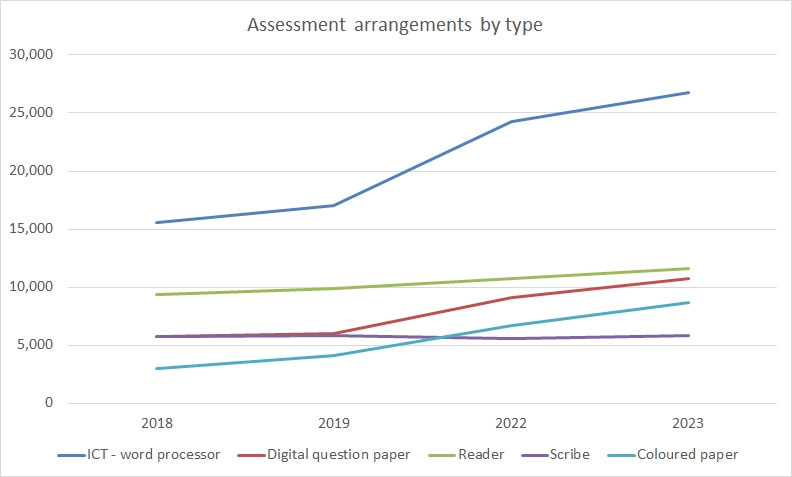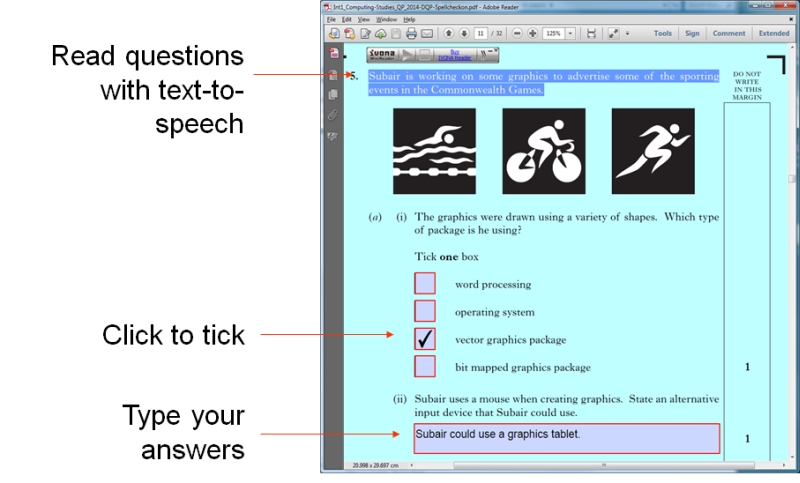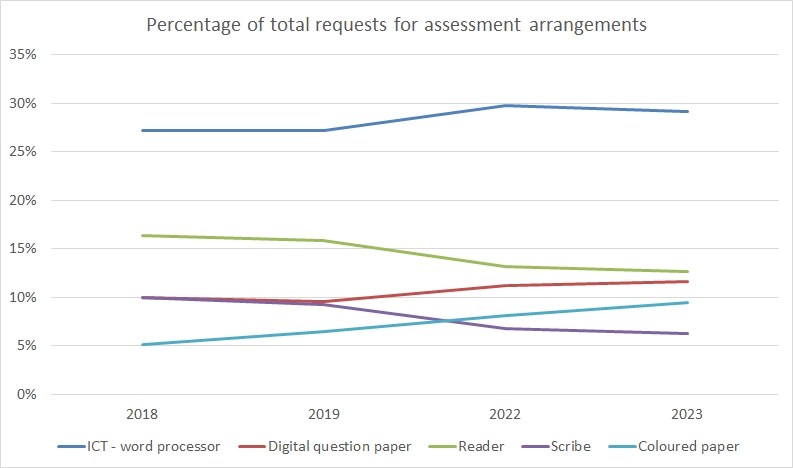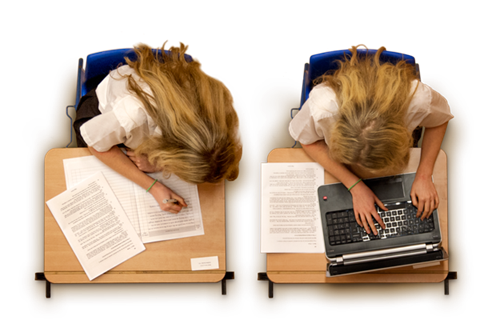 Newsletter: join thousands of other people
Newsletter: join thousands of other people
Once a month we'll send you an email with news, research and thoughts, as well as training courses and free webinars you may wish to attend.
Our websites:
Posted by Paul Nisbet on the 24th August, 2023

SQA have published information about Assessment Arrangements in the 2023 examinations last term. The figures provide a snapshot of the type of support that pupils used in examinations this year, and by implication, the classroom.
Assessment arrangements (AA) are intended to allow "candidates who are disabled, and/or have been identified as having additional support needs, access to appropriate arrangements to complete the assessment without compromising its integrity". The type of support that can be requested can include, for example, extra time, separate accommodation, reader or scribe, the question paper in a different font or format, and use of a word processor.
SQA have just published information about the 2023 assessment arrangements and it shows that the number of pupils for whom AA were requested, and the number of requests, continues to rise - the number of learners increased by 10% to 28,345 and the number of requests by 12.75% to 91,880, compared to 2022.
.jpg)
This equates to around one in five of the students who sat exams this year, according to Emma Seith, writing in the TES magazine. The article quotes Graham Hutton, who was headteacher of Grove Academy in Broughty Ferry and is now with School Leaders Scotland, who says that:
schools were finding it increasingly difficult to find empty classrooms, offices and small rooms where students could undertake exams outside the main hall
Digital assessment arrangements may help to address this issue, if students can use a digital paper with text-to-speech (and headphones) or a word processor and therefore we can have a group of pupils in one room, rather than individual students in separate rooms with a reader/scribe and invigilator.
One of the four principles governing assessment arrangements is that the arrangements requested should "reflect, as far as possible, the candidate’s normal way of learning and producing work" and therefore this information can give an indication of the type of support that learners are receiving in the classroom. Scottish Government census data tell us that 40% of pupils in mainstream state schools have an additional support need and so it's useful to look at the assessment arrangement figures and ask what type of support is being requested for pupils in exams. (We know that this only applies to pupils who sat National Qualifications and also that arrangements requested are not always used in an actual examination, but the information I think is still helpful.)
Here in CALL Scotland, we are most interested in the requests for digital assessment arrangements, and the number of requests for use of ICT (i.e. a laptop, iPad or Chromebook with a word processor) and for Digital Question Papers has continued to increase. Extra time and separate accommodation are the most common type of arrangements, followed by use of technology. The number of requests for readers has also increased, and for question papers printed on coloured paper. Requests for digital assessment arrangements are however more common now than for human scribes, which is good news in terms of independence.

Digital assessment arrangements have the potential to address both of these support needs - instead of a human reader, students can use text-to-speech, while instead of using coloured paper, pupils could use a digital paper and change the colours on screen. Note that we are not promoting the use of technology over other methods as a general approach, because there are plenty of good reasons why students might prefer to use a human reader and a paper copy of the examination, but we should be asking whether digital papers with text-to-speech might provide a more independent way for pupils to access the questions papers.
By learning how to use assistive technology and accessible digital resources, students can be more independent and develop more useful life skills than relying on a human reader or scribe. If pupils can use digital technology in class and reduce reliance on a reader/scribe, they can again be more independent, will have better opportunities to access learning and express themselves, and the need for support staff should reduce, which is helpful given the number of learners with additional support needs and the pressure on support staff.

The graph below shows the percentage of requests that included ICT, digital paper, reader, scribe and coloured paper. Here we find small increases in digital and coloured papers and small reductions in ICT, reader and scribe. This gives a better view of the type of support over time than the number of requests, and does suggest that readers and scribes are becoming less commonly used.

However, we also know from our research that pupils in many parts of Scotland are being provided with personal iPads or Chromebooks, and that very few of these learners are able to use them for digital assessments in examinations. One reason is that current SQA policy does not allow devices to be connected to the internet during exams, another is that it is very difficult to organise 'exam profiles' on iPads and Chromebooks, and lastly, the apps or extensions for accessing digital question papers and answer booklets are either not available or are not very good.
We have a couple of working groups looking into possible solutions and hope to pilot some approaches this term.


4-week short study online course

Once a month we'll send you an email with news, research and thoughts, as well as training courses and free webinars you may wish to attend.
Our social media sites - YouTube, Twitter and Facebook